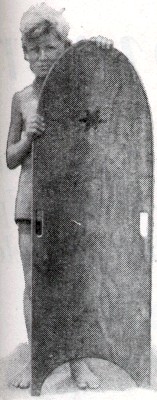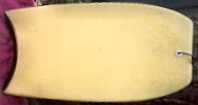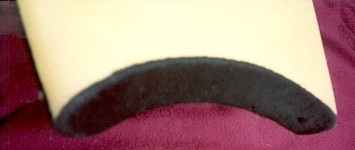 |
surfresearch.com.au
the catalogue
#30
|
| 1980 | Morey Boogie Mach 7.7 3 ft 6" | #30 |
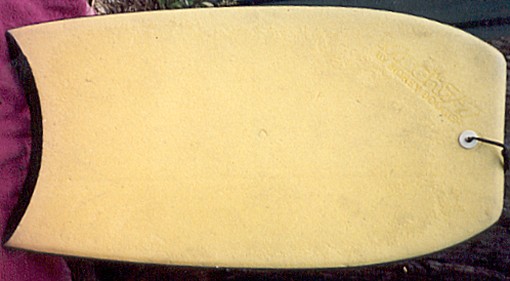
MANUFACTURE
MANUFACTURER:
SHAPER:
DESIGN: Morey Boogie Mach 7
DESIGNER: Tom Morey
SPECIFICATIONS
CONSTRUCTION
Foam core with laminated sponge deck and rails, and plastic 'slick' bottom.
Post production wrist plug at the nose.
DIMENSIONS
FEATURES
Nose: Square
Tail: 2" concave, chamfered
Deck: flat
Bottom: flat
Rails: chine/'vaccum track'
Rocker: nose lift
FIN/S: none
DECOR
DECALS
Deck:
Bottom:
MARKINGS
Deck: Moulded script Morey Boogie Mach 7
Bottom: Adhesive sticker
COLOUR
Deck: Yellow
Bottom: Orange with black rails
COMMENTS
REFERENCES:
http://www.vintagebodyboards.com/
http://bodyboardmuseum.com.au/history/
CONDITION: 8
MANUFACTURER:
SHAPER:
DESIGN: Morey Boogie Mach 7
DESIGNER: Tom Morey
SPECIFICATIONS
CONSTRUCTION
Foam core with laminated sponge deck and rails, and plastic 'slick' bottom.
Post production wrist plug at the nose.
DIMENSIONS
|
Length:
|
3
|
ft | 6 | inches | ||
|
Width:
|
22
|
inches |
Wide
Point:
|
+ve 5 | inches | |
|
Nose
:
|
21.5
|
inches |
Tail:
|
21
|
inches | |
|
Thickness:
|
2
.25
|
inches |
Pod:
|
18
|
inches | |
|
Nose
Lift:
|
inches |
Tail
Lift:
|
inches | |||
|
Weight
|
kilos |
Volume:
|
litres | |||
|
Swallow:
|
-ve
2
|
inches |
FEATURES
Nose: Square
Tail: 2" concave, chamfered
Deck: flat
Bottom: flat
Rails: chine/'vaccum track'
Rocker: nose lift
FIN/S: none
DECOR
DECALS
Deck:
Bottom:
MARKINGS
Deck: Moulded script Morey Boogie Mach 7
Bottom: Adhesive sticker
COLOUR
Deck: Yellow
Bottom: Orange with black rails
| NOTES BOARD HISTORY: DESIGN HISTORY Flexible foam belly-board invented by Tom Morey in 1971 as an offshoot of his experimentation leading to the Morey-Doyle flexible surfboard. Based on generations of prone boards and incorporating flex and ‘vacuum track rails’ (Greenough / Brock hull design). In particular, note the tail of juvenile prone boards as shown in Hi Sibley's Surf Sleds and Boards (1928) and the wide template of the inflatable surf-o-planet from the early 1930s, see below. The soft foam construction circumvented the body surfing area restrictions at many popular beaches. Originally offered as a buyer assembled/mail order product, see below. The most popular surf craft design of the twentieth century. Surfer Volume 14 Number 3, September 1973. Page 85: Pipeline. Imaginative Tom Morey dropped in with a prototype for a new water toy he's developed. It's a flexible, semi-inflatable, closed cell, lite weight, hi-density, rotationally molded surf form. You can bend it, shove it, slide it, hop it, twist it. Says Tom, "the game is not how fast you go; it's the sensations of movement." It's shaped kinda like a knee board with hard low rails, and you can ride waves with it that weren't possible on conventional rigid-forms; i.e., gnarly shore pounds, rocky breaks, etc. How radical can you get with it? Morey replies, "like with a pen or pencil - a kid will scribble, a master will create art." How do you surf it? "You boogie." And that's gonna be its name. |
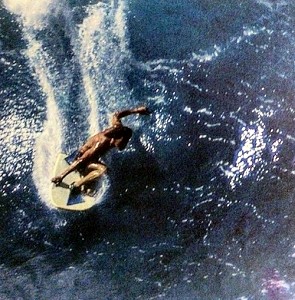 Jack
Lindholm, Pipeline, 1979.
Photo: Bob Barbour |
| One of the
first Boogie Boards imported into Australia, 1973. Originally offered as a buyer assembled/mail order product. The product arrived with instructions for construction and How to Boogie. Length: 3ft 6.5" Width: 24" Thickness: 2.5" Photos and dimensions Werri Beach 12th June 2021, many thanks to Neil Cameron. 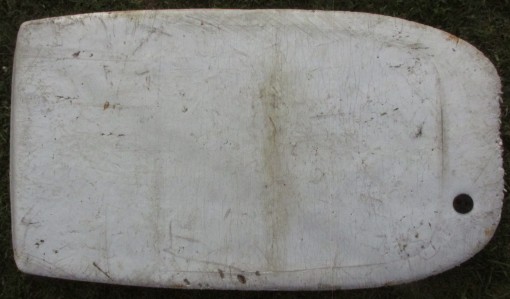 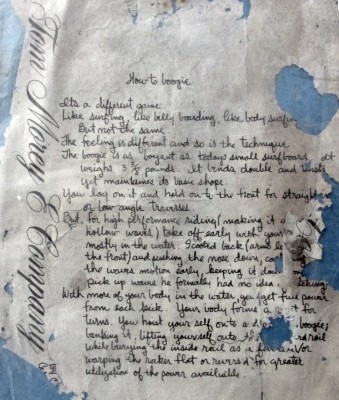 |
 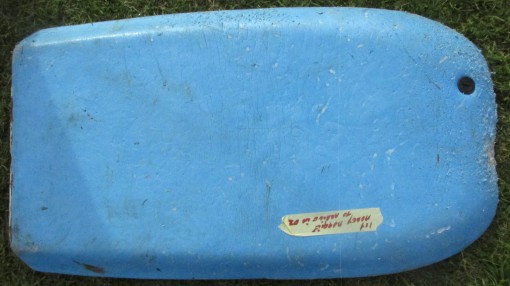 Tom Morey and Company
Its
a different game.How to Boogie. Like surfing, like belly boarding, like body surfing. But not the same. The feeling is different and so is the technique. The boogie is as boyant as todays small surfboard. It weighs 3 5/8 pounds. It bends double and twists yet maintains its basic shape. You lay on it and hold onto the front for straight or low angle traverses . But for high performance sliding (making it ... hollow waves) take off early with your (body?legs?feet?) mostly in the water. Scooted back (arms ... the front) and pushing the nose down, co... the waves motion early, keeping it down ... pick up ... pick up waves he formally had no idea of catching. With more of your body in the water, you get full power from each kick. Your body forms a (??) for turns. You hoist yourself onto a (...) boogie; banking it, lifting yourself onto (??) rail while burying the inside rail as a (??) warping the rocker flat on turns for greatest utilization of the power available. |
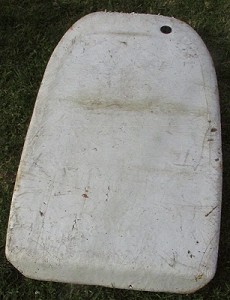 |
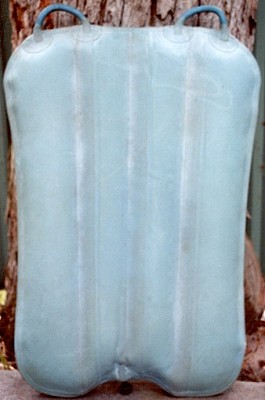 |
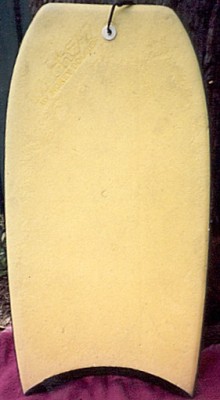 |
COMMENTS
REFERENCES:
http://www.vintagebodyboards.com/
http://bodyboardmuseum.com.au/history/
CONDITION: 8
|
|
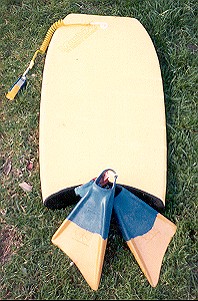 Bulpinda Munnungurr, 1986. |
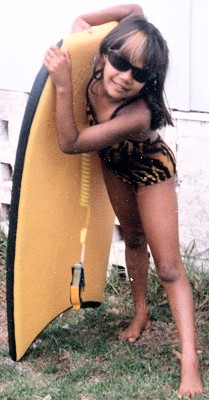 |

surfresearch.com.au
